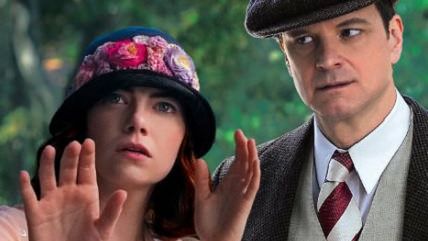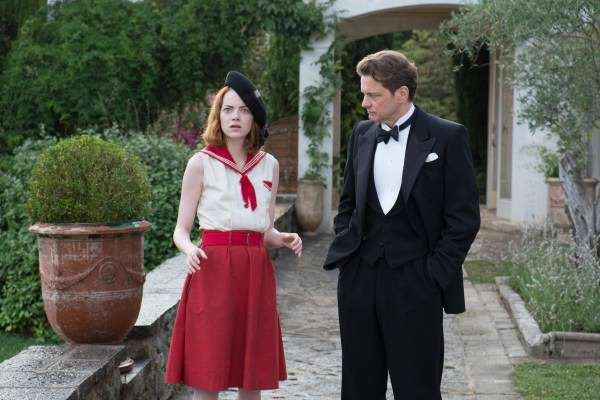Magic in the Moonlight: Good Woody. Lucy: Girl Powers.
Colin Firth joins Allen on the Côte d'Azur, and Scarlett Johansson explores several new mental dimensions.


Woody Allen's Magic in the Moonlight returns us to the toddling times of his Oscar-winning Midnight in Paris. This movie doesn't have all the resonant nostalgia of that one, but it's cleverly scripted and consistently funny, and it demonstrates again the pleasures that Allen, now in his seventh decade of filmmaking, can still deliver.
The year is 1928, and an English stage illusionist named Stanley (Colin Firth) is touring the Continent in his professional guise as a wily Chinese magican called Wei Ling Soo. When he's not wowing audiences with his wondrous feats (disappearing elephants, sawing assistants in half), he maintains a small sideline in exposing phony spirit mediums. "There is no spirit world," he says, and that's that.
Backstage in Berlin one night, Stanley is approached by Howard (Simon McBurney), an old friend and fellow illusionist. Howard has come across a new medium, a young American woman named Sophie (Emma Stone), who's currently resident in the South of France, where she's snookering the wealthy Catledge family, no doubt with an eye on their money. Howard has witnessed the séances in which Sophie summons the spirit of the family's departed patriarch, and he can't figure out how she does it. Can Stanley come take a look?
Arriving at the Catledges' spectacular mansion on the Côte d'Azur, Stanley sees that the family scion, ukulele-strumming Brice (Hamish Linklater), has fallen completely under Sophie's spell, and plans to make her his bride. ("Do you like to travel?" he asks her. "On yachts?") Stanley is appalled. He'll soon get to the bottom of this.
But Sophie proves hard to nail. Watching her summon knock-knock responses at a séance, and float candles in the air as well, he can't explain her methods either. And she seems able to divine an awful lot about him, sensing some sort of Chinese connection and mentioning the fiancée who's waiting for him back in London. Stanley's dismal philosophy – that there is no spiritual dimension to human existence, that life is brought to a full stop by death – slowly begins to crumble. If Sophie really has established contact with an "unseen world," as she puts, maybe it's time to adjust his sourball convictions in a sunnier direction.
The movie is gorgeous from beginning to cute-twist end. Cinematographer Darius Khondji, shooting his fourth Allen film, renders the Riviera exteriors with a glittering beauty that might take your breath away. And costume designer Sonia Grande, another Allen vet, gets the period fashions – cloche hats, tennis whites, pleated cream trousers – exactly right (or at least exactly as we've seen them in vintage movies).
There are a few problems. Firth gives a masterful portrayal of a buttoned-up prig – no surprise – but he's so caustically hostile you wonder how anyone could put up with him (especially beyond the point that romantic comedy would customarily indicate as time for a turnaround). And Stone, who's rarely been so radiant (she seems to be lit from within), sometimes gives off flashes of a modern sensibility that's out of key with the movie's period feel.
But the picture may be most interesting in what it tells us about Allen himself. When Stanley says, "I think Mr. Nietzsche has disposed of the God matter rather convincingly," he's channeling the director's familiar dyspeptic view of life. But when Sophie quotes Nietzsche back at him – "We need our illusions to survive" – she's speaking for Allen as well. It's a small crack in his staunch pessimism, but it's suggestive. Is Woody Allen, at the age of 78, having second thoughts about all of this?
Lucy

Lucy is 90 minutes of sci-fi action junk from the madly prolific French filmmaker Luc Besson. The movie is boldly nonsensical and knowingly derivative, but it has a zany charm. How many writer-directors would anchor their story on a premise – the notion that human beings use only 10 per cent of their brains – that is widely known to be untrue? How many would make their protagonist an American party-girl-slash-student pursuing her education in Taiwan, of all places? And how many would think it a sufficient preemption of plot nitpickers to simply drop in a science guy from time to time to explain the inexplicable things that are going on? Not many, and maybe only one. But Besson thrives on this sort of baloney, and his enthusiasm can be infectious.
After an opening dawn-of-Kubrick shot of an ape crouching by a primeval pool, and some muttering about "what we've done with the world," we jump to Taipei, where the titular Lucy (Scarlett Johansson) is being forced by a boyfriend to deliver a locked metal briefcase to a drug-runner named Jang (Min-sik Choi, the extreme-sushi champ of the original Oldboy). Escorted to his lair by black-suited thugs, she finds Jang spattered with blood and surrounded by corpses. The man has been auditioning drug mules and found some of them wanting. The drug he's seeking to move is what's inside Lucy's locked briefcase – four sealed packages of CPH-4, a substance that's prized by users for its mind-mangling trippiness.
Jang adds Lucy to his mule team. He has one of the drug packages inserted into her abdomen through an incision that is then sewn closed. Unfortunately, a welcome-to-the-team stomping by Jang's goons bursts the package in Lucy's belly and the drug begins seeping into her bloodstream. (Besson helpfully plunges his camera straight down her gullet to show us some animated gastrointestinal chaos.) Her eyes turn a lasery blue, and she feels the onset of strange new powers – to read people's minds, bounce thugs off of walls, and change hairstyles at will.
By this point, we've already made the acquaintance of the movie's explainer, Professor Norman (Morgan Freeman), a brain-science expert who's guest-lecturing in Paris. His subject is the aforementioned 10-percent theory, which Norman discusses as if it weren't in fact a baseless myth. We wait patiently for the movie to rejoin Lucy, who's up to more interesting things.
The picture has quite a few laughs, not all of them inadvertent. After the chemically enhanced Lucy butt-kicks her way out of Jang's headquarters, she heads for a hospital to have the drug package removed from her innards. Marching into the O.R., she shoots the patient already on the operating table (knowing at a glance that he'd be dying anyway) and orders the surgeon to get to work on her. As he starts cutting, she borrows his cellphone to call her mom back in the States. I don't believe I've encountered a scene like this before. Johansson also gets to deliver some prize dialogue, along the lines of "Without time we don't exist" and "I'm colonizing my own brain." We roll with it.
Besson seems never to have met an action cliché he didn't love, especially if it involves slo-mo. There's an elaborate bullet ballet that's unblushingly lifted from The Matrix; and as Lucy careens through the streets of Paris in a stolen police cruiser, pursued by Jang and his apparently bottomless supply of thugs, the requisite automotive pandemonium is so predictably over the top that we stare at it in both wonder and indifference.
But the action is at least loud and plentiful, and Johansson has fun playing a woman who's turning into a drug robot. (As she demonstrated in Under the Skin, she's an actor who can make deadpan signify.) The movie is a big, garish entertainment – it's pure Besson. Which could be either a warning or a commendation, I know. Your call.


Show Comments (20)